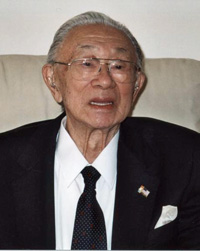I didn't remember Asahi was a newspaper too until I finally clicked the link and saw the dreaded headline "Cappy Harada, who shaped Japan-U.S. baseball, dies at 88".
I found out about Tsuneo "Cappy" Harada when doing some research about the Brooklyn Dodgers visiting Japan for a project my friend Pete was working on. Every time I read something about major leaguers going to Japan after World War II Cappy's name came up as an aside, almost in the margins. He was just there. He would be the fourth guy in a picture with Lefty O'Doul and other U.S. stars. He would be shown alongside MacArthur and an Asian dignitaries. He was always there, and I thought, "Who the hell is this guy?"
We interviewed Cappy in his home in Palm Desert, California where grapefruit trees lined his street and roadrunners ran in the yard. He thrilled us with tales of pre-WWII baseball in California and the battle in the Pacific. He spoke intimately about MacArthur, Joe DiMaggio and Marilyn Monroe. He enjoyed every second of recounting his long, fascinating life. I could hardly believe that this man's story was relatively unknown.
Below is a short biography I wrote about Cappy when I was organizing my thoughts for the project. It's far from complete, but gives you some idea of who he was. (Actually, I'm not sure I even wrote it. It just isn't very good, so I assumed it was by me.)
I'll try to write a more complete elegy this week.
Tsuneo “Cappy” Harada was born in Santa Maria, California in 1921 to immigrant Japanese parents. The consummate athlete, he earned the name Cappy by being captain of his high school basketball, baseball, and football teams.
In 1935 the first Japanese professional baseball team, which later became the Tokyo Giants, toured the U.S. playing exhibitions against amateur and professional teams. Cappy acted as second baseman and translator for a local 9 made up of merchants who scrimmaged against the Giants. At but 14 years old he had begun what would become a lifelong relationship with professional Japanese baseball.
While being scouted by the St. Louis Cardinals Cappy chose to enlist in the U.S. Army following the attack on Pearl Harbor. He was assigned to work with MacArthur as a Japanese interpreter and code breaker during the War and later joined MacArthur’s inner circle in running occupied Japan. As MacArthur grew frustrated at the progress of rebuilding Japan Cappy became instrumental in encouraging the return of baseball to the Japanese people who had seen their most beloved sport banned by their own government towards the end of the War. Cappy oversaw the revival of college baseball first, then professional, then the famed Koshien high school baseball tournament. In bringing about the return of professional baseball he invited American pros to tour Japan on good will tours beginning in 1949.
Cappy returned to American and became a scout for the San Francisco Giants introducing the first Japanese player, Masanori Murakami, to America in 1964. Cappy went on to become general manager of the Lodi Crushers.Here are some more stories about Cappy:
Short bio
A short obit
A Bio from the Japanese Consulate General in LA
A John Holway story reprinted by The Baseball Guru

1 comment:
So sorry to hear of your friend's passing. I had not heard of the man before, but I'll certainly check out some of the links.
Post a Comment